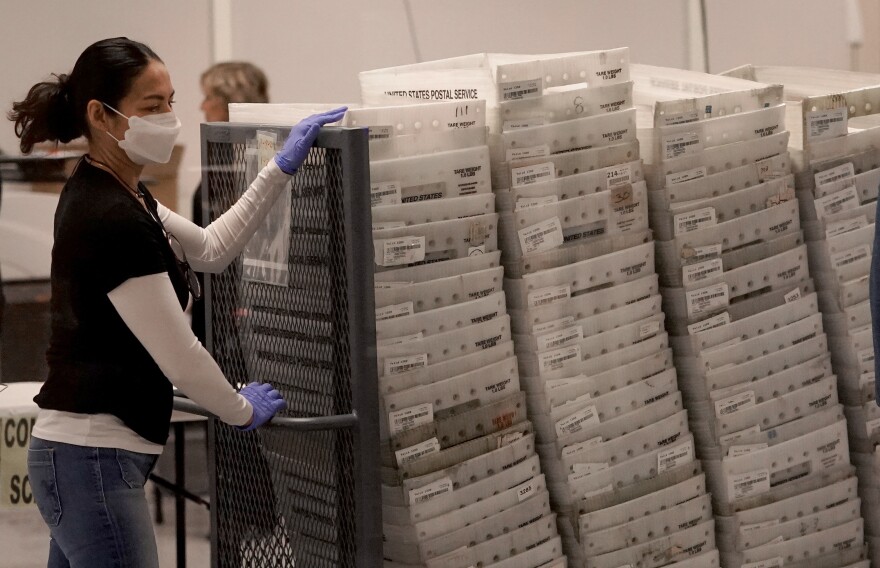Election officials in the swing state of Arizona are still processing and counting hundreds of thousands of ballots cast during this year's midterm elections, leaving the results of key races in limbo.
Experts say a combination of Arizona's voting laws and shifting voter behavior are to blame for the long wait for vote totals, and tight margins mean outlets like The Associated Press can't call certain contests.
Tammy Patrick, a senior adviser at the Democracy Fund, spent a decade working as a Maricopa County election official, mostly as a federal compliance officer. Maricopa is home to Phoenix and more than half the state's voters.
Patrick says the nuts and bolts of how elections are run in Arizona haven't changed a lot since her time there. But she says voter behavior and political realities have.
For one, Patrick says she thinks voters in Arizona have changed their voting behavior in response to all the misinformation that has been circulating about mail-in ballots.
"There has been this narrative around voting by mail that it is ripe with fraud and ... you shouldn't trust it," she says.
This distrust, Patrick says, could be why more voters decided to drop off their ballot at a polling site on Election Day, as opposed to mailing it days in advance.
"It's typical for Maricopa County to see about 180,000 ballots be turned in on Election Day," she says. "When I was there for that decade that was kind of the standard number."
This year, though, local election officials reported a whopping 290,000 ballots were dropped off at polling locations on Election Day.
"So, we don't know if that's because voters heard these stories around drop boxes being a bad way to turn in your ballot or because they saw the vigilantes and the watchers and some of them didn't feel comfortable dropping them at drop boxes," Patrick says.
Voters might have also heard messaging about voting on Election Day being a better option, Patrick says, and decided to turn in the mail ballot they already had instead of waiting in a line.
"That's what is so challenging in this moment is really having an understanding of who these voters were and what their motivations were," she says.
Criticisms and comparisons
Whatever the reason for the influx, though, now election officials have to process and tabulate all those ballots. That means signature verification and ballots being checked by bipartisan teams.
Patrick says one thing that could speed up this process is an "extraction" machine. Many counties in Florida, in particular, use an inhouse device that cuts the top of an envelope with a laser and then opens the envelope with air, which makes it much easier to remove the ballot.
"That's much, much faster than having the processing board sitting there literally with letter openers opening up over a million envelopes," she says.
Broadly speaking Arizona and Florida have similar deadlines and processing rules for mail ballots, though some smaller regulations and procedures — like the inhouse extraction Patrick described — offer some key differences. Regardless, Florida has become a popular point of comparison for those on the political right criticizing Arizona's elections management.
Among those taking aim at Arizona's elections management are Kari Lake, the GOP nominee for governor, and Mark Finchem, the Republican nominee for secretary of state. Both Lake and Finchem have echoed the lie that the 2020 election was stolen.
Counting is still ongoing across the country
Regardless of state laws and practices, though, almost all jurisdictions in the U.S. are still technically counting and processing votes.
In Leon County, Fla., officials there said in a statement that even though they "have the overwhelming majority of ballots counted and election results reported by election night," there is still work that needs to be done. That includes processing provisional ballots and ballots from abroad.
Patrick says even though the media calls races on election night, "there isn't a state in the nation that declares winners on Election Day because they still have so much work to do," which includes curing mail ballot signatures and processing overseas votes.
Ultimately, she says, Arizona is under this kind of scrutiny mostly because of the political importance of the outcomes of key races there, as well as how close vote margins have gotten in Arizona. She says because the media feels less comfortable calling the race right now, the perception is that this is taking much longer.
"This is how long it always takes," Patrick says. "The work continues until every eligible vote is counted."
Copyright 2022 NPR. To see more, visit https://www.npr.org.






